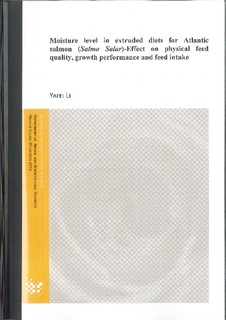| dc.description.abstract | The aim of the study was to investigate the effect of moisture content on physical quality of extruded pellets such as hardness, DORIS value, water stability, bulk density, length and diameter. The experimental diets were also fed to Atlantic salmon in order to investigate effect of moisture of extruded pellets on weight gain, feed intake and feed utilization. A 91-day feeding experiment was carried out using fish with 968 g average initial weight, kept in seawater at 9.4 °C. Four experimental diets differing in water content were produced by adjusting drying time. The diets contained 2.5% (diet A), 5% (diet B), 7.5% (diet C) and 10% (diet D) of moisture. Diet C was soaked in salt water for 2 h before feeding and labelled diet E.
Significant differences among diets were found in hardness, DORIS value, water stability, bulk density, pellet length and diameter. Diet D with highest moisture level (10%) showed higher hardness, higher bulk density and less broken pellets compared to the other diets. Diet A with the lowest moisture level (2.5%) had significant lower water stability than the other diets after 60 min and 120 min in shaking water bath. After 240 min incubation in the shaking bath, diets D and E showed numerically higher water stability compared to the other three diets. High bulk density was associated with harder and less broken pellets. High hardness of pellets was associated with higher water stability. Atlantic salmon fed diets D and E had in average a non-significant but numerically higher weight gain, feed intake, specific growth rate, specific feeding rate, thermal growth coefficient compared to the other dietary treatments. A non-significant but numerically lower feed conversion ratio was observed fed fish with diet D compared to the other diets.
In conclusion, the present experiment showed that increasing moisture level in diets significantly improved physical quality of pellets, but had no effect on weight gain, feed intake or feed utilization. A numerical higher feed intake of the diets with highest moisture level indicated that elevated moisture level may have a potential to increase feed intake. | no_NO |
